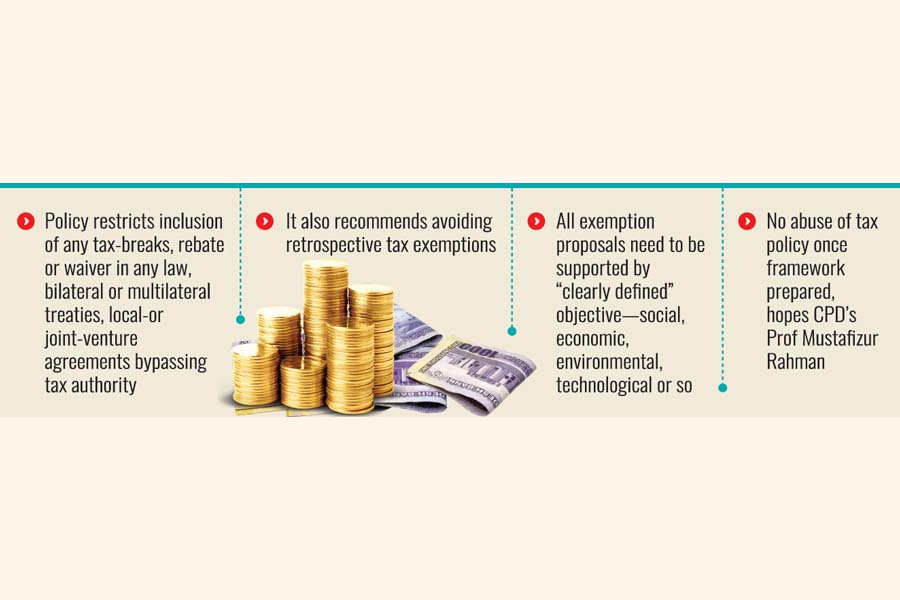Draft policy framework seeks to toughen tax exemptions
None else but NBR to present tax-waiver issues in parliament
Main objective is to end exemption culture in phases: NBR chair

Published :
Updated :

The draft of a new policy framework aims to tighten tax-breaks as it bars any agency or authority but the government revenue board from placing any tax-exemption issue before parliament.
The National Board of Revenue (NBR) has prepared the draft policy framework that provides for restricting inclusion of any tax-breaks, rebate or waiver in any of the law, bilateral or multilateral treaties, local or joint-venture agreements bypassing the tax authority.
The revenue board, assigned to collect nearly 90 per cent of the domestic revenue for Bangladesh exchequer, has kept such provision in the 'Tax Expenditure Policy Framework'.
The draft framework, obtained by the FE, is an integrated one comprising income tax, customs and value-added tax (VAT) wings.
It is likely to be placed before the advisory council of the interim government for approval ahead of the next budget session.
Talking to The Financial Express Sunday, NBR chairman Md Abdur Rahman Khan, who is also Secretary of the Internal Resources Division (IRD), said the NBR is discouraging tax-exemption proposals from being placed in parliament by other agencies or entities in a bid to maintain a well-coordinated fiscal-policy formulation.
"Only NBR will prepare tax-exemption proposals for parliament. No other agencies will be allowed to do the job," he added.
Many of the laws have tax-exemption provisions and approved by parliament where the NBR remains in the dark, he noted.
Usually, he points out, international or local agreements require NBR vetting before final deal, which may not be approved without parliament's consent.
However, the NBR chief says the framework is in drafting stage now and may undergo several changes until it gets final approval from the Ministry of Finance and later from the government's advisory council.
"Main objective of the NBR is to phase out from TE culture. And for this, we would cut discretionary power of NBR or other agencies to allow TE," he says.
Parliament or public representatives will decide the areas to TE, he adds.
Distinguished fellow of the Centre for Policy Dialogue (CPD) Professor Mustafizur Rahman appreciates the move to keep intersectoral balance in macroeconomic perspective.
"The provision is linked to government's move on separation of tax policy from tax-implementation wing where only rigorous exercise on policy formulation would be conducted to support trade, investment etc," he told the FE.
Unless the influential parliament members impose the TE decision for their own businesses, there would be no abuse of tax policy once the framework prepared, he explains.
"We are hoping that the NBR will get autonomy and freedom to take decision on placing TE proposals before parliament."
The policy framework would also have specific provisions to axe tax benefits rationally and logically with a timeframe to phase out.
A 'Sunset clause' to ensure periodic review process of the tax expenditure would be there.
"….a sunset clause will be assigned to each tax-expenditure provision as a means to define legally binding termination date," the draft framework reads.
Talking to the FE a senior tax official said the legal provision would restrict any extension of the tax breaks, unless state emergency, through persuasion, lobbying or any political pressure.
Officials say it is high such legal provision was framed during the interim government's tenure as a political government may not be able to stick to its position on tax-exemption issues considering vote-bank.
"The tax exemptions incorporated into the tax legislation will include a sunset clause with certain exemptions such as exemptions granted to public sectors like health, education agriculture etc," it reads.
To ensure a periodic review process of the tax-expenditure programme, the sunset clause will be assigned to each tax-expenditure provision as a means to define a legally binding termination date.
"A clear definition of the benchmark for each tax's legal structure against which deviations are to be considered tax expenditures represents the technical cornerstone upon which tax-expenditure design, cost estimation, and monitoring are built upon," it is stated in the draft policy.
For tax-expenditure cost estimations, the NBR will follow the revenue- foregone method, wherein tax expenditure is estimated to be the revenues that would be collected should the tax-expenditure measure not be in place, without consideration of taxpayer behaviour.
The government would extend TE or consider new proposals to incorporate into the tax law on the basis of cost-benefit analysis upon approval by parliament.
The policy framework also recommends avoiding tax exemptions on retrospective effect.
"A person shall not be entitled to further tax exemptions in any other manner or for any other period for a source of income against which such person was granted tax exemption for a definite period by the legislation and such person shall not be entitled to tax exemption in case of reconstruction by amalgamation, demerger and acquisition," the draft says.
All tax-exemption proposals will be supported by a clearly defined objective it intends to peruse, in terms of social, economic, environmental, technological or any other policy consideration, it adds.
The proposal on TE initiated by the NBR must entail a thorough estimation of the benefits and revenue foregone to be accrued during its enactment timespan.
doulotakter11@gmil.com


 For all latest news, follow The Financial Express Google News channel.
For all latest news, follow The Financial Express Google News channel.